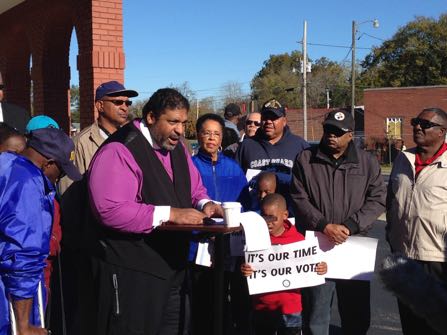
DETROIT (AP) — At Sunday services, in rallies and on social media, black pastors urged congregants to vote, hoping to inspire a late flood of African-American turnout that could help propel Democrat Hillary Clinton to victory in critical swing states on Tuesday.
In Detroit, a pastor spoke of voting and citizenship. In Philadelphia, the minister reminded congregants others had died for their chance to cast a ballot. The Rev. Jesse Jackson spoke to a crowd of a few hundred people gathered in front of City Hall in Tallahassee, Florida, right before they marched a block over to the county courthouse to vote early.
Along with women and Hispanics, African-Americans are seen as critical to Clinton’s chances against Republican Donald Trump, who polls show is not popular among black voters. However, early voting data from key states indicate turnout will not be as high this year as it was four years ago, when Barack Obama, the nation’s first African-American president, was on the ballot. Sunday’s efforts were aimed at minimizing that decline.
Bishop T.D. Jakes, pastor of the Texas megachurch The Potter’s House, who has a national and international following, tweeted on a red, white and blue backdrop, “Make sure your voice is heard. Vote on Nov. 8.”
“Preachers are trying to strike a moral nerve and somehow penetrate the fog of indifference and try to remind people what’s at stake this year,” said the Rev. James Forbes, retired senior minister of The Riverside Church, who has been traveling the country to mobilize voters. He will speak Sunday night in New York for a national get-out-the-vote telecast from the church called “The Revival: Time for a Moral Revolution in Values.”
Forbes and other pastors have taken pains to emphasize they were not endorsing a candidate, but it was hard to mistake some remarks Sunday that signaled a deep opposition to Trump.
“There are some folk in this country who think that to make this country great again, we’ve got to exclude folks,” said the Rev. Mark Tyler, pastor of Mother Bethel A.M.E. Church in Philadelphia, founded in the 18th century as one of the first black churches in the U.S. “We’ve always been great because we’ve always been open to strangers. If it was not for the goodness of the first Americans, there would be no America today.”
The number of African-American voters has increased steadily: 12.9 million in 2000, 14 million in 2004, 16 million in 2008 and 17.8 million in 2012. In the last presidential election year, blacks for the first time voted at a higher rate, 66.2 percent, than did whites (64.1 percent), or Asian-Americans or Hispanics, with rates of about 48 percent each.
Besides the absence of a black candidate on either major-party ticket, community leaders and others blame the lower turnout so far on voter suppression efforts, such as limits to early voting hours in some communities and challenges by individuals to voter registrations. A federal judge last Friday ordered registrations to be restored in three North Carolina counties for what could be thousands of challenged voters.
Underscoring the importance of black voters to her campaign, Clinton started her day Sunday with the largely African-American congregation of Mount Airy Church of God in Christ in Philadelphia. The Rev. Leah Daughtry, chief executive of the Democratic National Convention, spoke across town at Mother Bethel A.M.E. Church.
Worshippers clapped and cheered as Tyler, the Mother Bethel pastor, told them “don’t let there be any excuse” for not showing up at the polls, even with a lingering public transit strike. “Somebody died for you to have a right,” Tyler said.
In Tallahassee, the event with the mayor, local pastors and Jackson evoked a street carnival amid the sizzle of thick sausages cooking on the grill and snow cones being distributed. Jackson referenced civil rights leaders and the chaotic 2000 presidential election he contended was “stolen” on behalf of George W. Bush by the U.S. Supreme Court.
Roz Booker, a 56-year-old black voter, said this election season has been a “mess,” but her ancestors had died for the right to vote and she had already cast her ballot. Booker described herself as “anti-Trump,” criticizing the Republican nominee for what she called “promoting hate” against minorities.
At New Destiny Christian Fellowship, a predominantly black church in Detroit, the pastor spoke of being a “good citizen” on Election Day. Congregant Tiffany Gunter, who is voting for Clinton, noted that enthusiasm in 2016 was lower among African-Americans than in the previous presidential race. “What Hillary Clinton has is experience. Is she perfect? Absolutely not. There are things about her that I wish were different, but I believe that she does listen and she can adapt,” Gunter said.
In North Carolina, where clergy and others have led marches to early voting sites, preliminary early voting totals showed a drop in percentages for Democratic and black voters compared to 2012, while unaffiliated and Republican vote totals were higher.
“We better vote, simply because people have tried to take the right,” said the Rev. William Barber, state president of the North Carolina NAACP, outside a church in Wilson, about 40 miles east of Raleigh, as he worked to mobilize voters Saturday.
The Rev. Michael McBride, pastor of a predominantly black church in California and a leader of the PICO Network, which works for criminal justice reform and against gun violence, said the bitter tone of the campaign and the personal attacks between Trump and Clinton have “really worn on a lot of people” and drained interest in voting.
“I think we have to temper some of our disappointment with the reality that we’re going to have to live with our decision for the next four years or eight years,” said McBride, who has been traveling the country to rally voters. “Folks are wrestling with that.”
_____
Zoll reported from Amherst, Massachusetts. Gary D. Robertson in Wilson, North Carolina; Errin Haines Whack in Philadelphia; Gary Fineout in Tallahassee contributed to this report.
PHOTO: AP
















